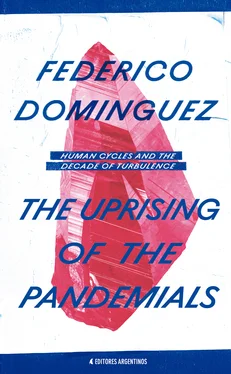Since the 1980s, tax systems have become increasingly less progressive. Today, an average American pays almost 27% of their income in taxes, a number that jumps to 40% when you consider healthcare payments made by their employer. In comparison, the top 1% pays 27% in taxes and the richest 400 families pay only 23%. This is because taxes on consumption, labor, and healthcare account for almost the entire tax burden of those who earn the least. In contrast, they represent a very low percentage among those with higher incomes.
Let us take a look at where these incomes come from. The maximum tax rate on personal income is 45% in most European countries, 37% in the United States (with certain states adding local taxes), 45% in China, and 32% on average in Latin America. (61) The consumption tax is around 8% in the largest US states, (62) whereas in Europe and most developing countries it is roughly 20%. Argentina is a peculiar case, reaching 34% once VAT, provincial taxes, and other distortive taxes are taken into account. On average, social security tax is 21% in the European Union, 12% in Latin America, and only 7.65% in the United States. (63) Although the tax rates of the richest people may seem high, in practice, there are several deductions and mechanisms to reduce the effective, real rate, while those who earn the least tend to spend a higher percentage on taxes due to the impact of labor and consumption taxes.
A progressive tax system should be simple, with few taxes and few exceptions. Some of its components should be low taxes on consumption and labor, a significant additional tax on second homes not currently being rented, income taxes with few deductions, taxes on share buybacks, carbon tax, and limits on the use of trusts and other tools for reducing tax payment. Exceptions and complexity not only benefit the rich but also add accounting, legal, and administrative expenses to the entire economy, increasing the prices of goods and services. Americans spend 8,900 million hours a year filling out tax returns, which represents 45 hours for every adult. This costs the economy $409 billion a year, (64) which is equal to 2% of GDP and would be enough to reduce the amount of income tax paid by Americans earning under $77,000 a year from 12% to 2%. (65) It is unfathomable that in the era of artificial intelligence and automation, it is so expensive and difficult to pay your taxes.
Now, in regard to the current tax rates for the richest sectors, both on labor and capital, I do not believe they should be increased. A rate higher than 40% discourages investment, risk-taking, innovation, and private initiative. The problem is that due to the complexity of the tax system and intricate legal structures, many people end up paying far lower rates and evading them altogether, generating a significant shortfall in tax collection. It is preferable to have a lower income tax than a higher one with a host of exceptions.
According to the IMF, tax evasion costs governments $3 trillion a year, and bribes cost them another $1.5–$2 trillion. Tax havens cost us between $500 billion and $600 billion a year in lost public revenue. (66) According to a 2019 paper published by Larry Summers, an American economist and former director of the National Economic Council for President Obama, tax evasion in the United States could reach $7.5 trillion in the next 10 years, of which $5 trillion will have been evaded by the richest 1%. (67) With that money you could cut taxes for the lowest income bracket, finance the “de-carbonization” of the global economy, and invest in science and infrastructure.
Offshore companies are at the center of the controversy around tax evasion. They are useful tools for carrying out international business deals or securing assets. In many cases, people who live in Russia, China, Argentina, Venezuela, and some African and Middle-Eastern countries chose to place their money offshore to keep their money safe from arbitrary government measures that tend to expropriate their citizens’ assets, not because they want to evade taxes. (68) But in the case of the citizens of developed countries, these instruments are frequently associated with tax evasion or tax deduction through mechanisms that may be technically legal but are highly questioned.
INEFFICIENT PUBLIC SPENDING
According to the IDB, inefficient public spending in Latin America and the Caribbean reaches up to 4.4% of GDP. Inefficiency includes “transfer leakage, deficient spending on public purchases, and deficient spending on employee compensation.” Values vary between 1.8% of GDP in Chile, 3.9% in Brazil and a rampant 7.2% in Argentina. According to this report, these inefficiencies add up to $220 billion annually, the equivalent of Peru’s total GDP. (69)
Argentina is the perfect example of inefficient public spending in Latin America. In 1962, GDP per capita in Argentina was higher than in Australia, Italy, and Japan, one of the richest countries in the world. Public spending was 20% of GDP. The South American country’s public education and universal healthcare ranked among the best in the world. In more recent years, its public spending has increased to around 40% of GDP, (70) but the quality of public healthcare and education has dropped significantly, while government employment has risen by 70% between 2001 and 2014, today at 3.9 million people. (71) The middle class not only pays twice as much in taxes than they did in 1962, today they must also pay for private healthcare and education, further reducing their available income.
Ultimately, this irrational public spending fostered by politicians and state technocrats is paid for by the public. It translates into higher taxes on consumption and labor, which mainly affect citizens with lower incomes while also creating such a heavy tax burden on the private sector, reducing economic growth and preventing the creation of quality jobs. There is a false belief among the left that public spending is always redistributive. However, this is not always the case. We must properly analyze how that spending is being funded. Taking more from the poor to then give to the even poorer, with the state keeping some for itself along the way is not the best formula for improving the quality of life of the disadvantaged.
THE NEXT CYCLE OF INEQUALITY
Argentinian philosopher Mario Bunge said in a 2008 interview with local newspaper Perfil: “As long as there are clear disparities, there will be class struggles and interests. The truth is that when you meet basic needs, conflict is subdued and more constructive tactics are adopted.” (72) In a context marked by the pandemic crisis, inequality will be more exposed than ever and the temptation to try and solve it using methods that already failed in the past will be stronger than ever before.
The current cycle of inequality will come to a close toward the end of this decade due to the inevitable shift in politics driven by the pandemials . The start of this new and inescapable cycle will either be thanks to a new generation of liberal governments that will tackle inequality pragmatically or by the arrival of populist governments that will reduce inequality using old-fashioned methods that may work in the short-term but will seriously affect investment and the economy’s ability to innovate, thus significantly impoverishing countries in the medium and long term.
When you do the math, you can see that there is a lot of money available to reduce inequality without turning to populist policies: $5 trillion between tax evasion and corruption alone. Another significant amount by reducing inefficient public spending as we saw in Latin America. Also, scaling down deductions and applying an effective 40% income tax on the rich could collect several hundreds of billions of additional tax dollars. This huge mass of resources will be necessary to reduce taxes on consumption and labor, the main culprits behind the limited available incomes of the lowest earners. What is equally as important as increasing available resources –if not more so– is eliminating regulations that restrict the supply of goods and services that constitute the meritocracy basket.
Читать дальше







![Theresa Cheung - The Dream Dictionary from A to Z [Revised edition] - The Ultimate A–Z to Interpret the Secrets of Your Dreams](/books/692092/theresa-cheung-the-dream-dictionary-from-a-to-z-r-thumb.webp)




